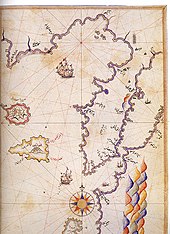Gulf of Saros


Gulf of Saros or Saros Bay (Turkish: Saros Körfezi; Greek: κόλπος Ξηρού, romanized: kólpos Xiroú) is a gulf north of the Dardanelles, Turkey. Ancient Greeks called it the Gulf of Melas (Ancient Greek: Μέλανας κόλπος, romanized: Mélanas kólpos).[1][2]
The bay is 75 km (47 mi) long and 35 km (22 mi) wide. Far from industrialized areas and thanks to underwater currents, it is a popular summer recreation resort with sandy strands and crystal-clear sea. Scuba diving, windsurfing and fishing are the most practiced water sports here.
Settlements around the bay are: Gökçetepe, Mecidiye, Erikli, Danişment, Yayla, Karaincirli, Vakıf, Büyükevren, Sultaniçe, Gülçavuş and Enez, all in Edirne Province. The islands of Gökçeada (Imbros) lie outside Saros Bay and Samothrace in the Aegean Sea, Greece, is in short distance.
The North Anatolian Fault Zone, the most prominent active fault in Turkey and the source of numerous large earthquakes throughout history, passes through the Gulf of İzmit and traverses the Marmara Sea reaching to the Saros Bay to the southeast.[3]
In relative proximity, although outside of the gulf, on the Southern shore of the Dardanelles, across from Gallipoli, is the location of legendary Troy.
Non-combat military incident
The bay served for a long time as a place for NATO's amphibious exercises. In the fall of 1992, the Turkish destroyer Muavenet was hit by two Sea Sparrow missiles fired by the U.S. aircraft carrier USS Saratoga during the NATO exercise "Display Determination" held in the bay. The incident cost the lives of five Turkish officers, while 22 others aboard were injured seriously.[4]
See also
- Battle of Gallipoli
- Botaş Saros FSRU Terminal, under construction as of 2022
References
- ^ W. W. How, J. Wells, A Commentary on Herodotus, 7.58
- ^ Strabo, Geography, 7.7
- ^ "North Anatolian Fault Zone". Archived from the original on 5 September 2006. Retrieved 4 August 2006.
- ^ "United States Court of Appeals, Eleventh Circuit No. 96-2167" (PDF). US Courts. Archived from the original (PDF) on 11 July 2012.
